We analyzed 3.6 billion articles to better understand evergreen content.
Specifically, we looked at a number of different factors (including content formats and promotional channels) that may lead to a higher chance of publishing evergreen content.
With the help of our data partner BuzzSumo, we learned a lot about why certain content continues to get shares and links over time.
Let’s get right into the data.
Here’s a Quick Summary of Our Key Findings:
1. List posts and how-to posts are the two “most evergreen” content formats. Presentations and press releases tend to be the least evergreen.
2. Podcast episodes very rarely get shared over time. In fact, podcasts are 4.28x less likely to be evergreen compared to a list post.
3. Content that’s heavily shared on Reddit has a high likelihood of becoming evergreen.
4. Articles with lots of engagement on Twitter very rarely end up receiving shares and links over the long term.
5. Posts that include “2020” or “2021” in their title tend to be highly evergreen. This shows that content with recent information is more likely to receive shares.
6. Content types with the highest proportion of evergreen content include “best of” lists, guides, data-driven research and industry reports.
7. Among publishers that we analyzed, Social Media Examiner, HBR and Mindful tend to publish the highest amount of evergreen content.
8. Verticals that tend to publish evergreen content most regularly include digital marketing, health, and technology.
9. Industries with relatively low amounts of evergreen articles include SEO, business, and fashion.
How-to Post and Lists Have a High Likelihood of Becoming Evergreen
First, we wanted to analyze the impact of content format on an article’s ability to become evergreen.
While the topic of a piece is obviously a key element of a piece’s interest over time, we hypothesized that the format might play a role as well.
Here’s what we found:
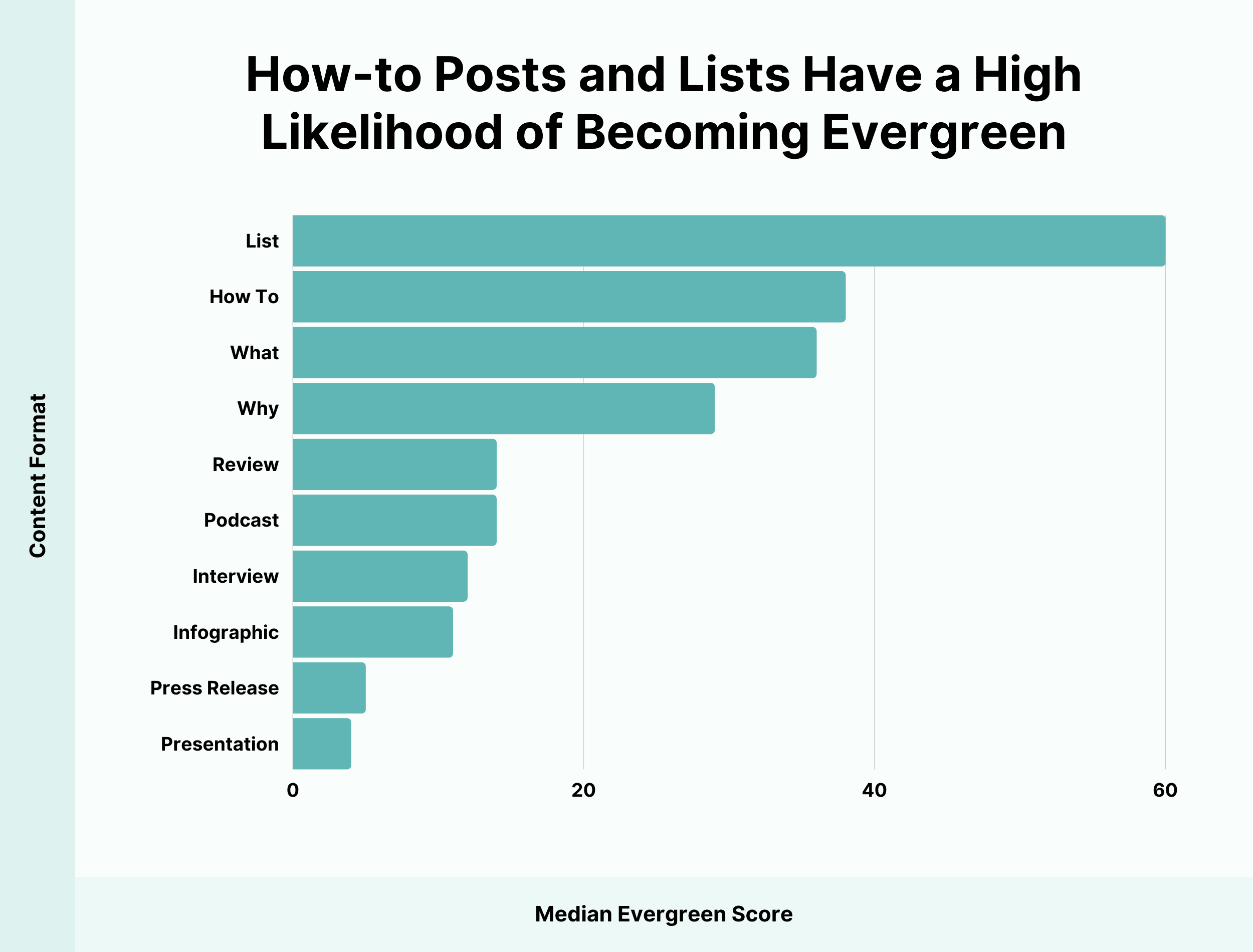
As you can see, list posts are (by far) the content format that tends to become evergreen most often. Followed by how-to posts, “what” posts and “why” posts.
This is in-line with our previous research, which found that list posts tended to get a high amount of shares overall.
To calculate how evergreen a piece of content was, we used BuzzSumo’s “Evergreen” metric.
This metric looks at shares and links that occur 30 days after an article was first published.
For example, this list post from Healthline has an extremely high Evergreen score:
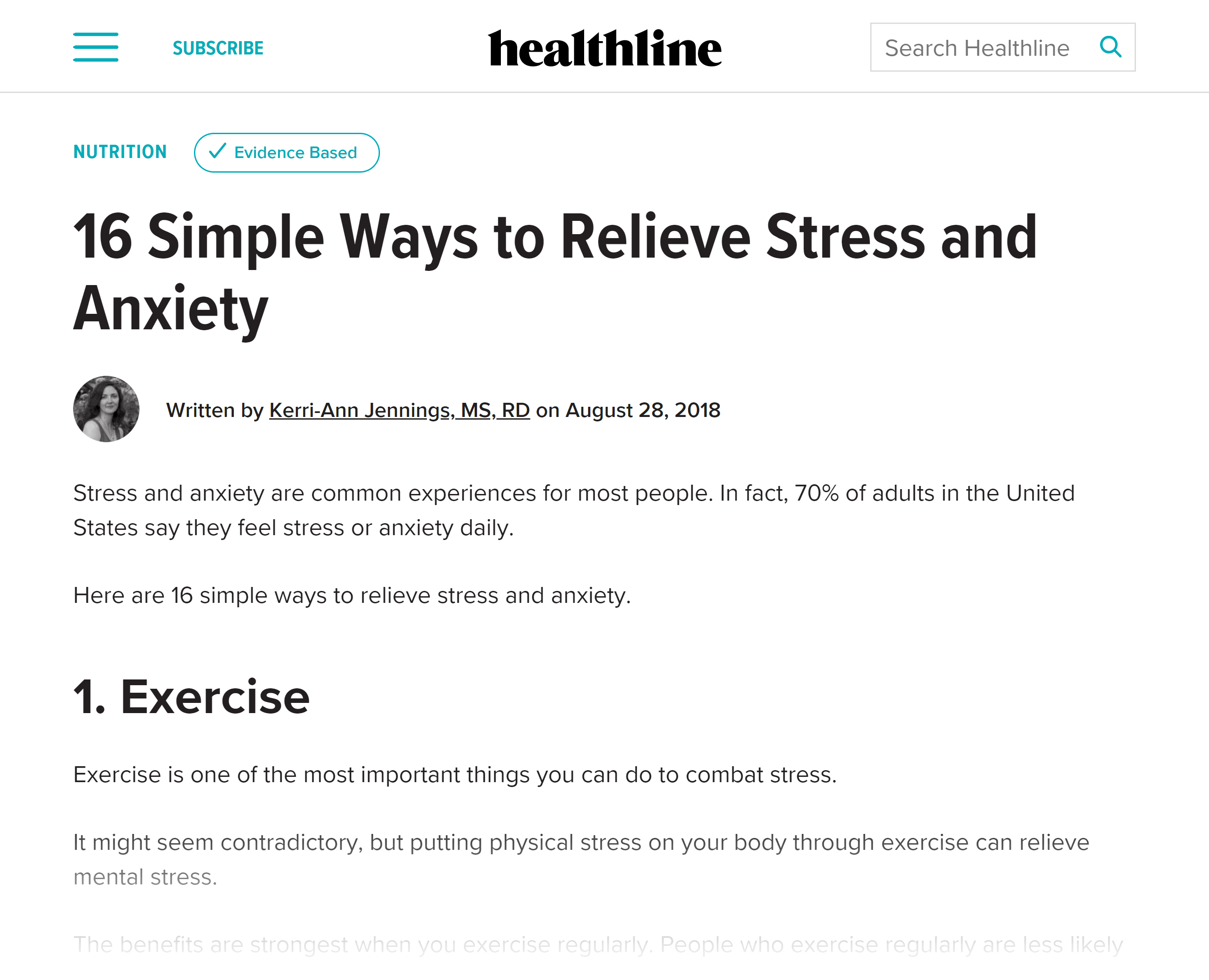
While this content did get a fair number of shares and links early on, the post continues to generate traffic and buzz years after it was first published.
Overall, we discovered that Evergreen scores were not evenly distributed between different formats.
In fact, a list post is 15x more likely to become evergreen than a presentation.
Key Takeaway: List posts and how-to posts appear to be the best content formats for publishers looking to maximize the amount of evergreen content that they publish.
Podcast Episodes Very Rarely Become Evergreen
We found that podcast episodes don’t generally have a very long shelf life.
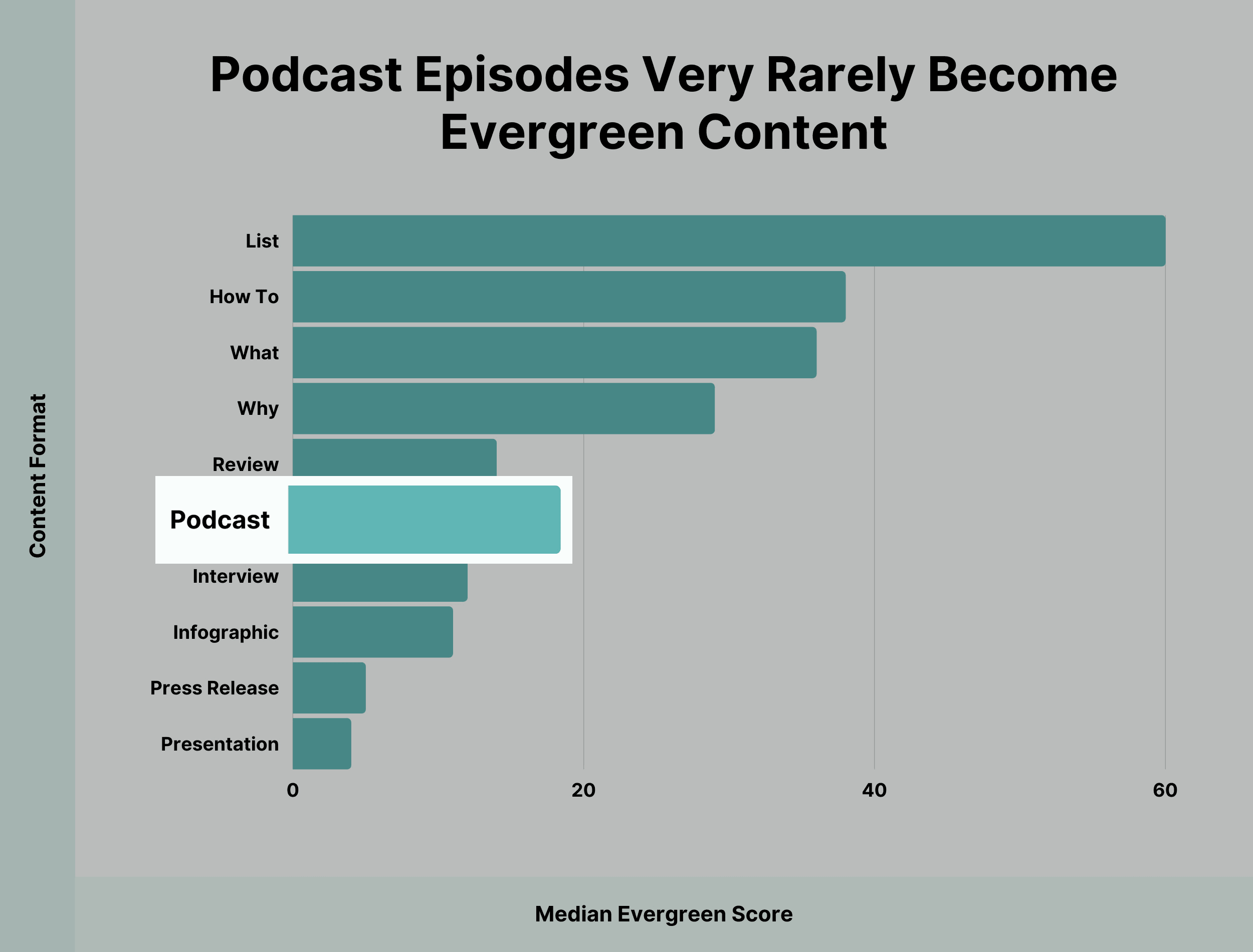
This may not come as a surprise to folks in the podcast space. There are definitely certain podcast episodes that people listen to years after they’re first released.
However, most people’s podcast apps are designed to feature new episodes that were just released.
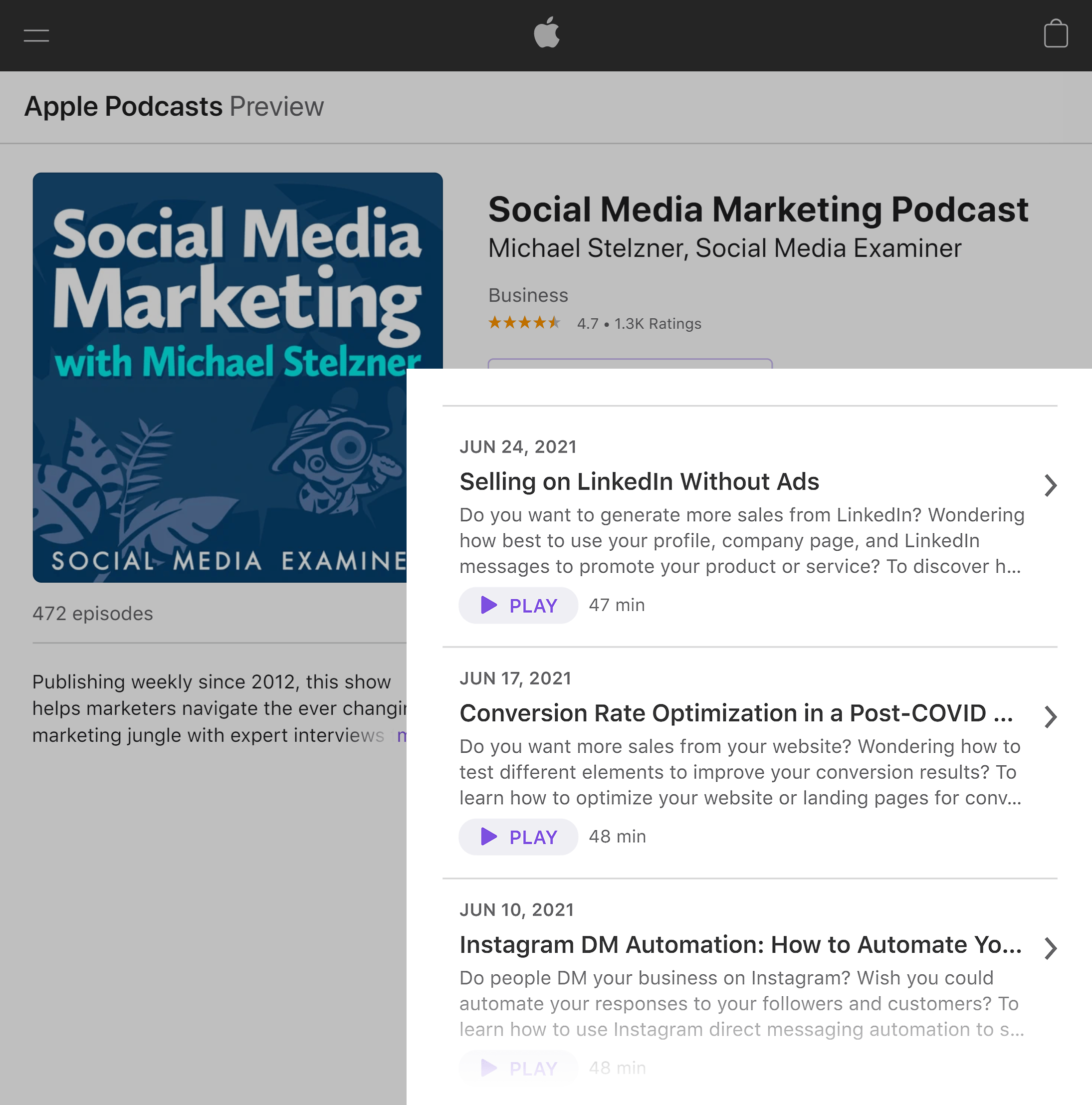
In fact, the feeds themselves are listed in chronological order. This may partly explain why very few podcast episodes receive social media shares after their first month.
We also found that content in the format of a presentation, press release or infographic tends to get most of their shares early. And then fizzle out. In fact, these three formats were even less likely to become evergreen compared to podcasts.
However, due to the fact that podcasts are an increasingly popular content format, we thought it would be helpful to highlight this finding.
Key Takeaway: Podcast episodes tend to create a buzz early on. But very few podcast episodes continue to receive shares and links over the long term.
Content With Engagement on Reddit Has a Strong Likelihood of Becoming Evergreen
Next, we wanted to look at the impact of engagement on different channels on evergreen content.
Specifically, we looked at how shares on four different popular social networks correlated with content becoming evergreen.
Here are our findings:
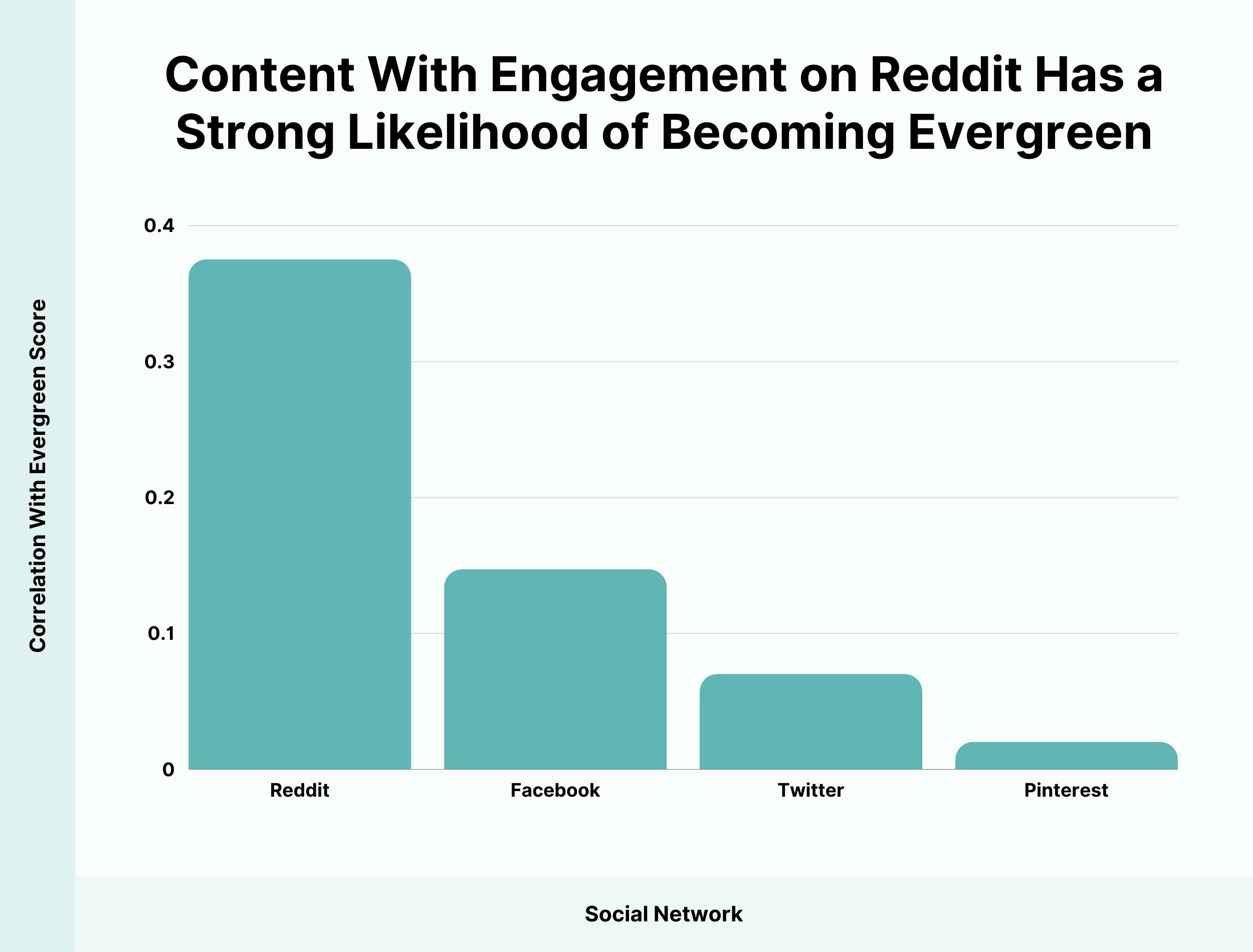
Among the articles in our data set, content with high engagement on Reddit had a relatively high likelihood of being shared over time.
Why might this be?
Like any social platform, Reddit’s users are interested in news items, recently-published content and trending videos. In fact, there are several subreddits dedicated to discovering new content on different topics.
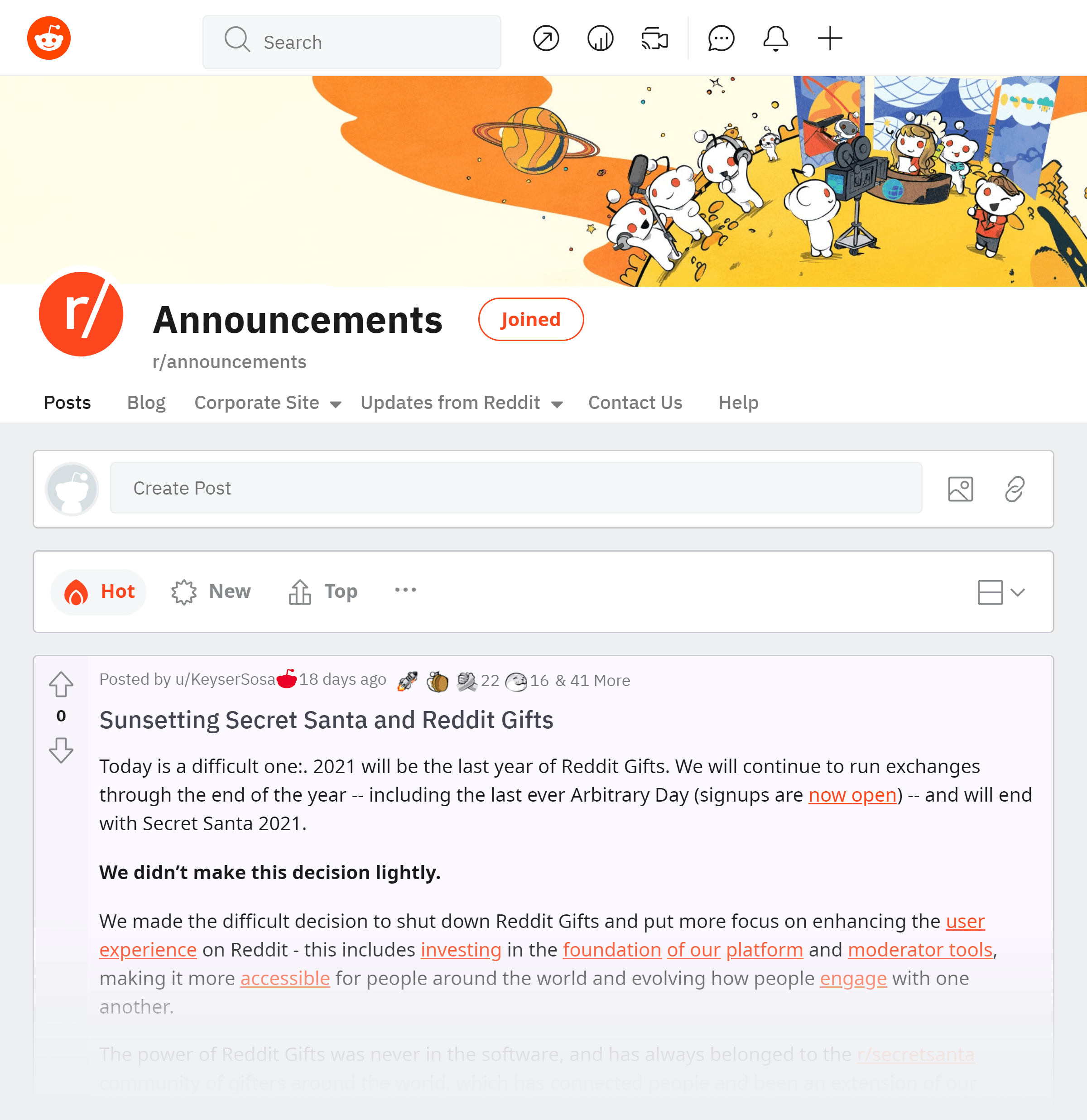
However, unlike other platforms, Reddit also has a fair number of users interested in timeless content. Including entertainment articles and videos that may have been published years ago.
For example, here’s an article from our data set that received quite a bit of Reddit engagement:
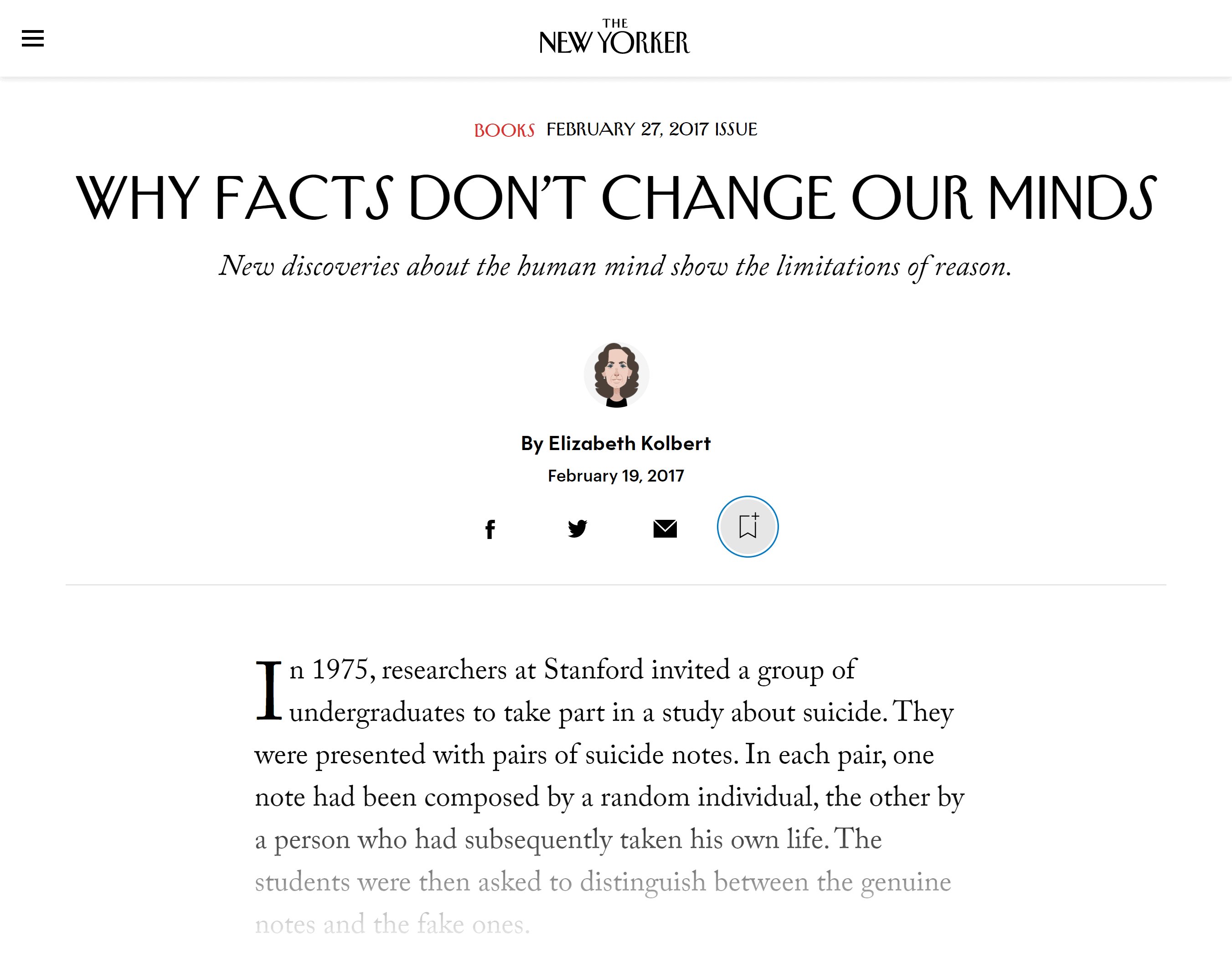
(That article also ended up having a high evergreen score.)
Unlike a news article or a piece from TMZ, this is the type of content that people can get value from months, years and even decades after it first goes live.
In fact, Reddit may be a helpful “litmus test” for figuring out which topics in your niche are likely to lead to evergreen content.
Key Takeaway: Reddit engagement highly correlates with an article’s chance of generating links and shares over time.
Twitter Shares Don’t Correlate With High Evergreen Scores
We discovered that content with lots of shares and retweets isn’t likely to have high evergreen scores.
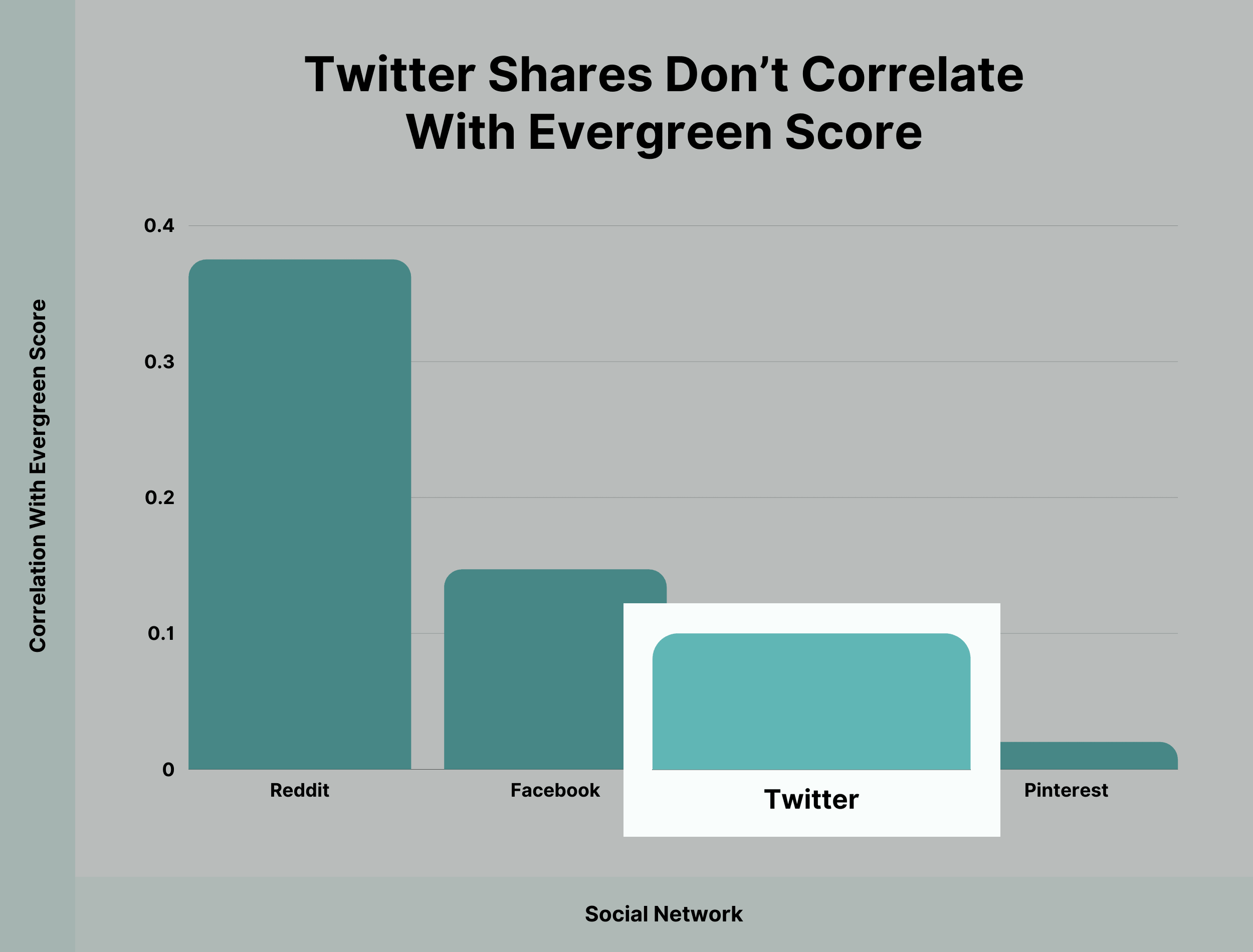
To anyone familiar with Twitter, this shouldn’t come as a surprise. The platform is largely dedicated to the here and now (in fact, Twitter’s tagline is “Happening now”).
There’s also the fact that many heavily-shared articles on Twitter are news pieces. Which, by definition, don’t receive much interest after they’re initially shared.
We also found that Pinterest pins didn’t tend to correlate with a blog post’s ability to become evergreen. Unlike Twitter, it’s possible for pinned content to appear in people’s feeds long after it’s first shared.
However, based on our data, it does look like heavy Pinterest pinning early on doesn’t indicate that an article will get long-term links and shares.
Key Takeaway: Twitter shares have very little correlation with a piece of content’s ability to become evergreen.
Posts With The Current Year In Their Title Are Likely to Become Evergreen
Interestingly, we found that articles that featured the current year in their title had a high chance of becoming evergreen.
At first, this finding may come as a surprise. After all, content that’s focused on a specific year is likely to become less relevant as time goes on.
However, there are two reasons that focusing on the current year can boost the odds that your content becomes evergreen:
First, content with recent information may get shares and links to begin with. And that effect persists over time.
(Remember that BuzzSumo’s Evergreen score counts engagement that happens after 30 days.)
So, depending on the month a post was first published, there are still months of potential sharing within the year featured in the title.
For example, here’s a post that contains the current year. And has a relatively high evergreen score:
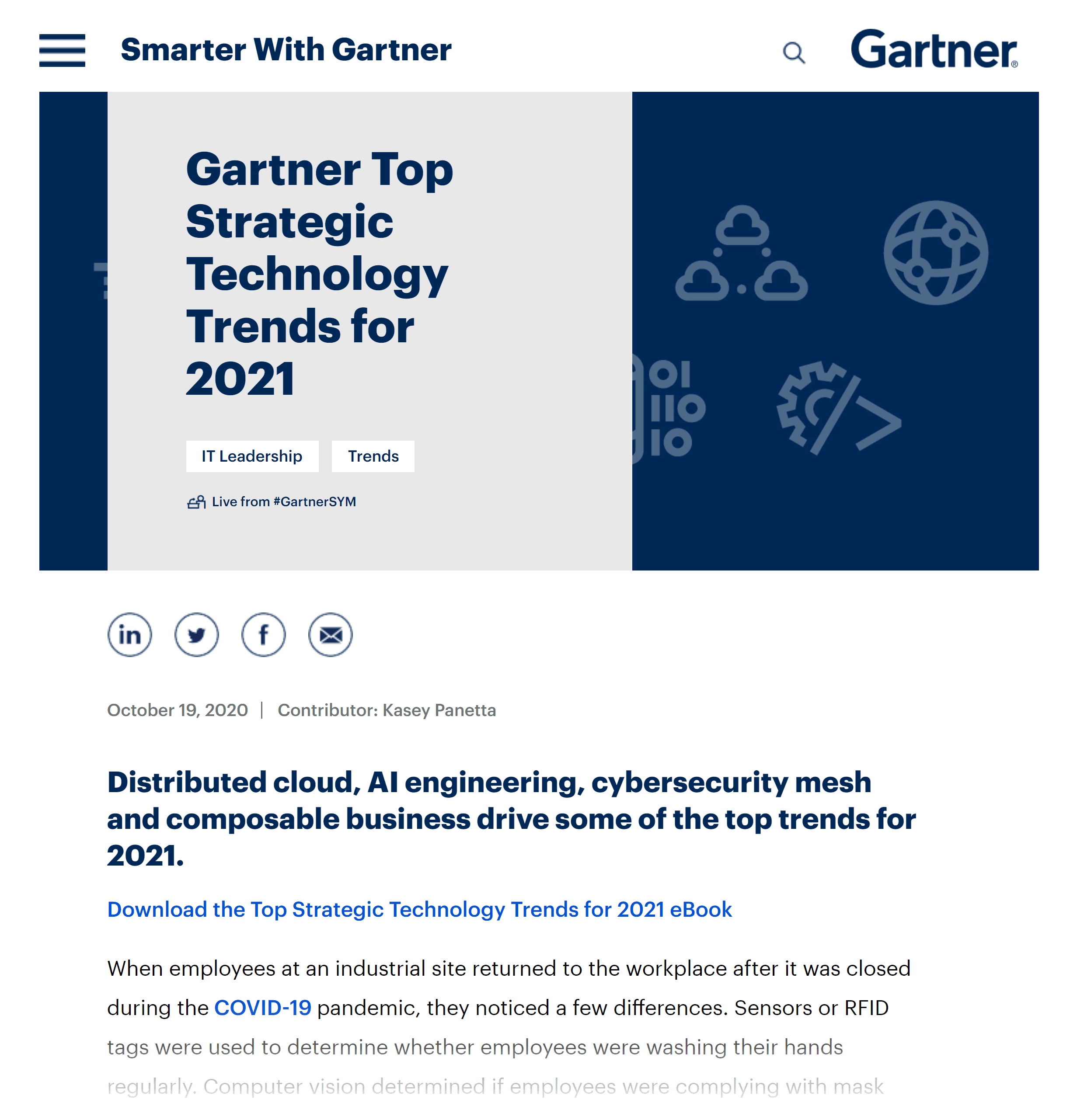
This is the rare breed of post that’s relevant the day it’s published. And can still be valuable months down the road.
Second, posts that feature the current year weren’t necessarily published that year.
For example, this post was first published in 2017:
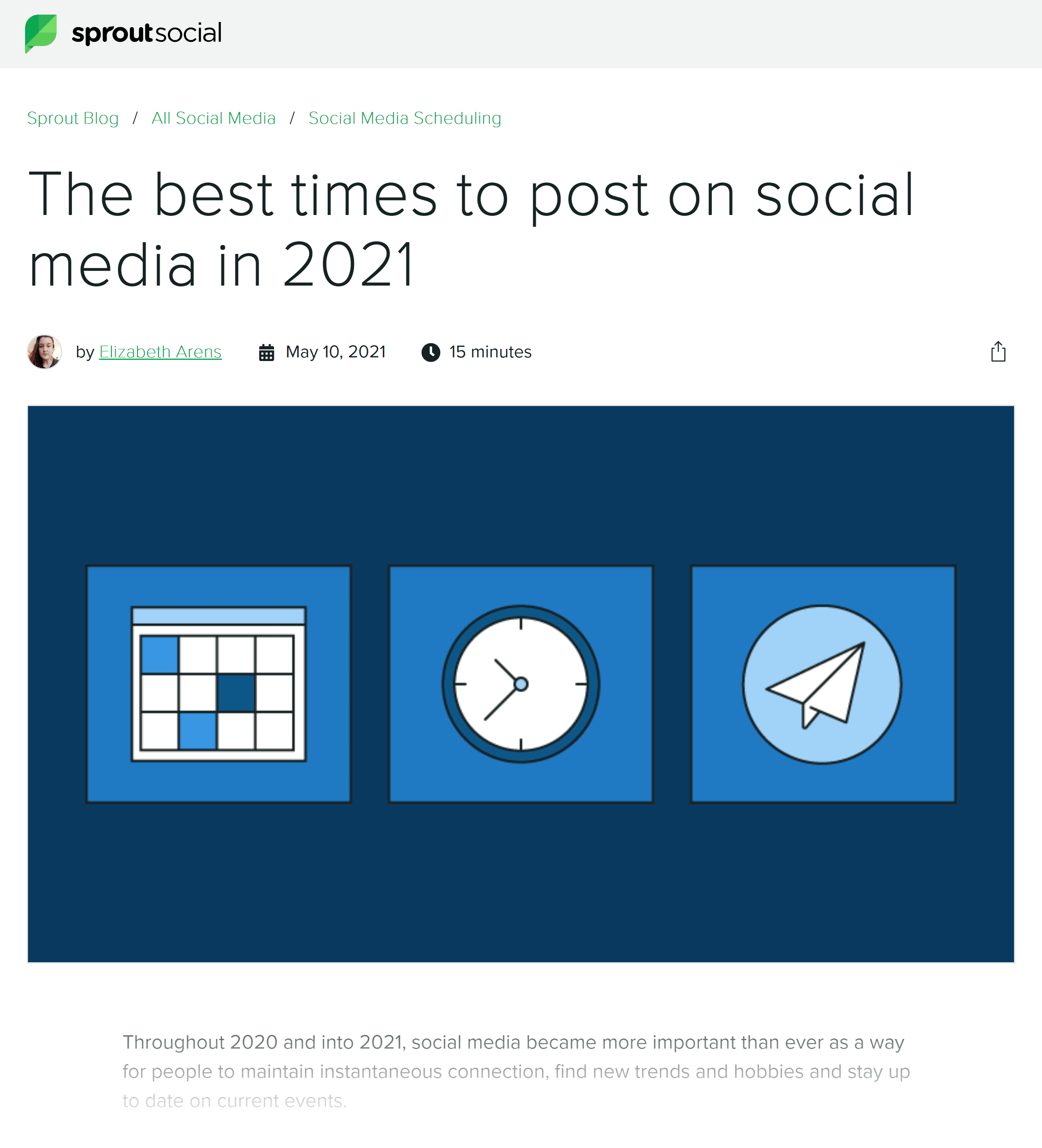
However, the title still contains “2021”. This reflects the fact that the post has been updated this year. Again, offering readers a piece of new (or updated) content likely leads to more shares.
Interestingly, we also discovered that including the year in your blog post titles seems to be more effective now compared to previous years.
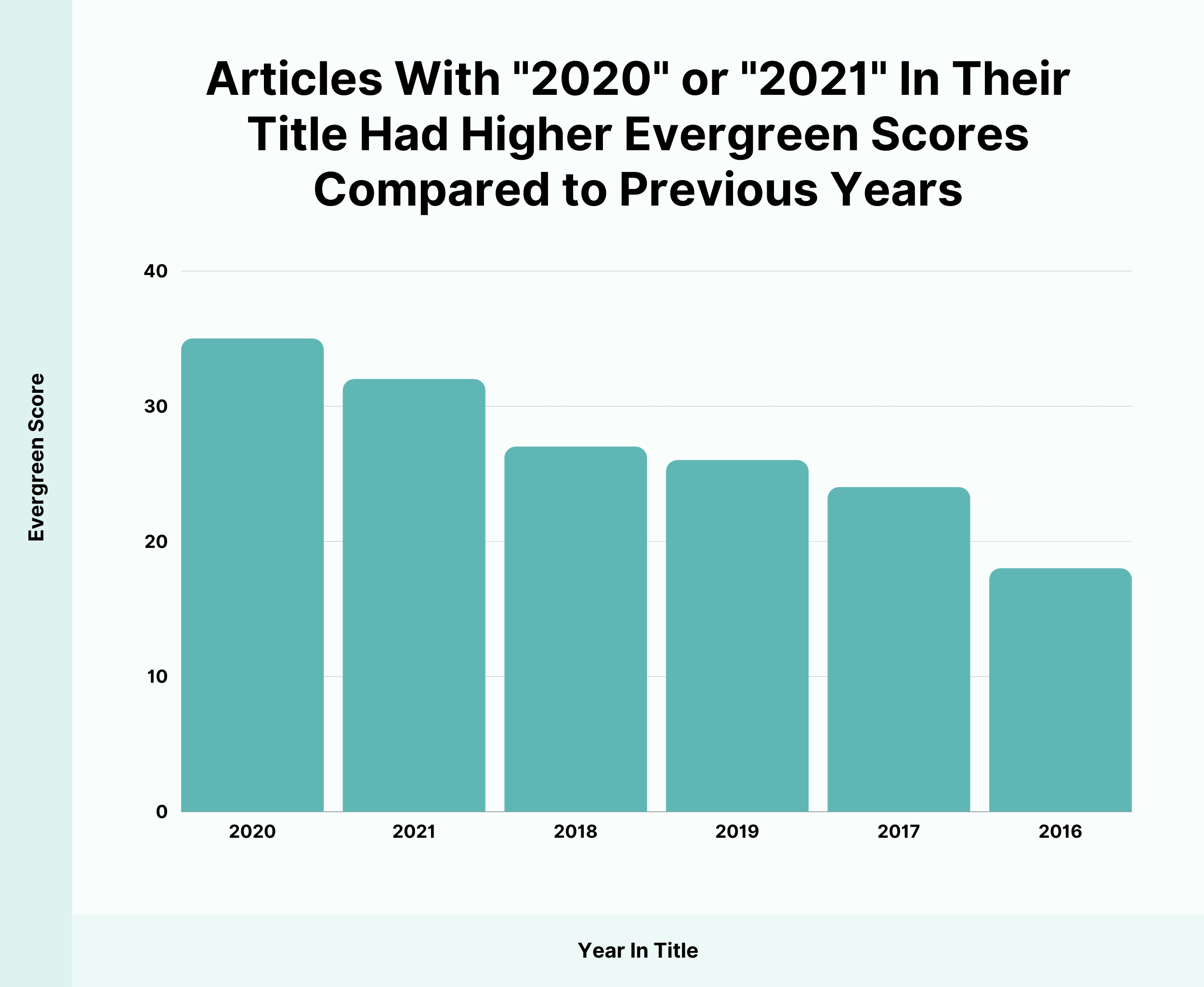
Specifically, articles with “2020” or “2021” in their titles had a median Evergreen score of 33 – significantly higher than previous years.
This may simply be due to the fact that there’s more content out there than ever before. And users are increasingly seeking out shortcuts (like a title containing “2021”) to help them find recent, relevant information.
It could also be due to 2020 and 2021 being dominated by the coronavirus. And considering the changes brought on by the world’s response to the virus, people increasingly saw content published before COVID as largely irrelevant. While a post featuring “2020” or “2021” would stand out as something relevant.
Key Takeaway: Including the current year in your title and title tag may help lead to more shares over the short and long term.
Evergreen Content Types Include Best Of Lists, Reports and Studies
Our next step was to drill down into specific content types that tend to result in evergreen content.
In other words, we identified top-performing formats (list posts, how-to posts, etc.) above. But there are dozens of different variations within those formats.
For example, a comprehensive list of dog breeds is going to be completely different than a list of tips for optimizing your site’s SEO.
Both are technically list posts. But the final result will be completely different.
This is why we wanted to dig a bit deeper into a number of popular content types. And figure out which content types were the best option for marketers wanting to put out more evergreen content.
To do this, we looked at terms that tended to appear in the titles of highly evergreen content.
Here’s what we found:
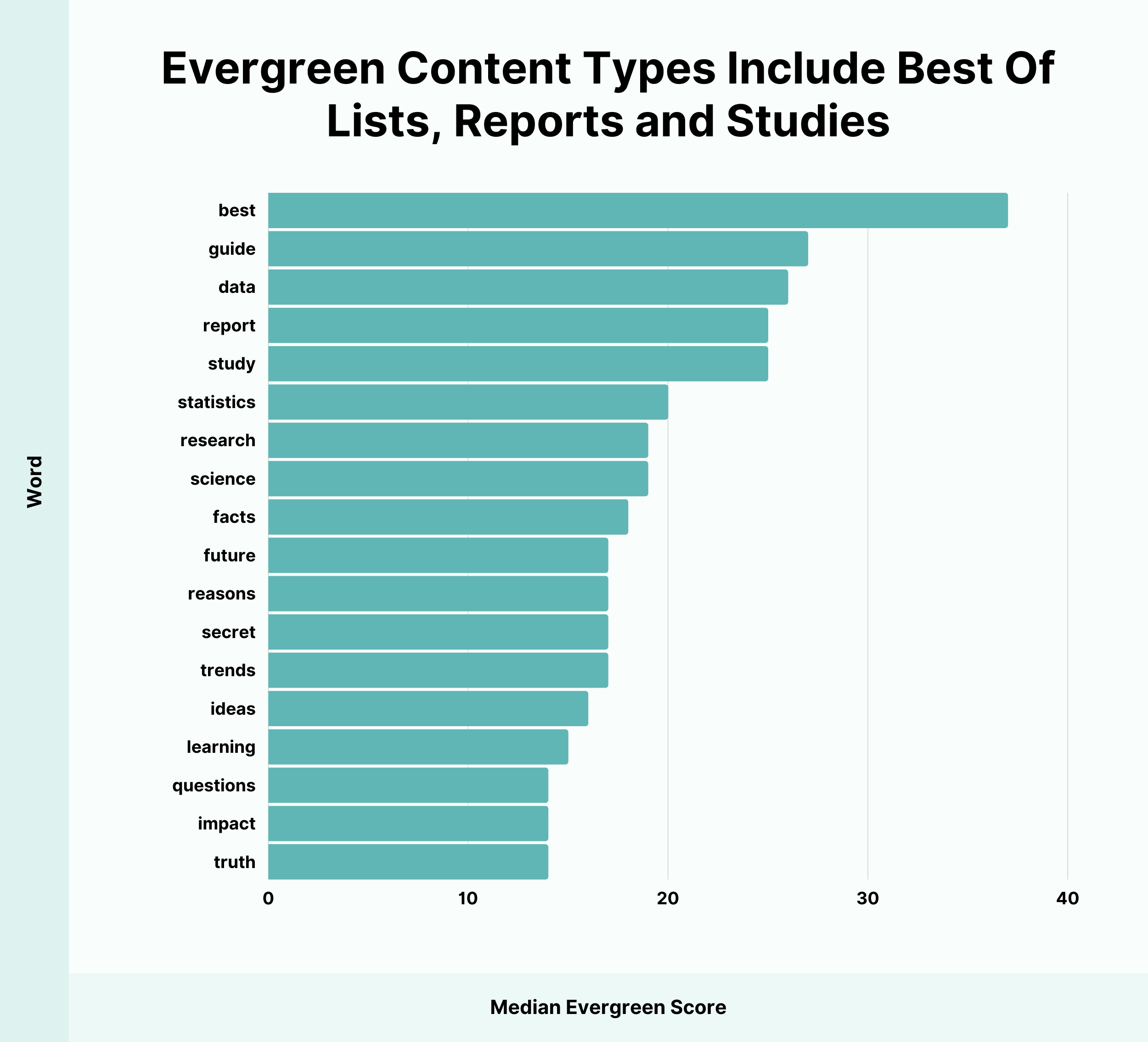
Content focused on “the best” tends to have the highest Evergreen scores.
This shows that readers highly value content that curates the best products, apps, videos and social media accounts in one place.
For example, here’s a “best” post from our data set:

Another highly evergreen content type was guides.
Like “best” posts, the main value of guides is that they save time. But instead of curating the best items, you’re essentially curating information.
For example, this beginner’s guide to blockchain from Forbes continues to get shares and links more than 4 years after it was first published:
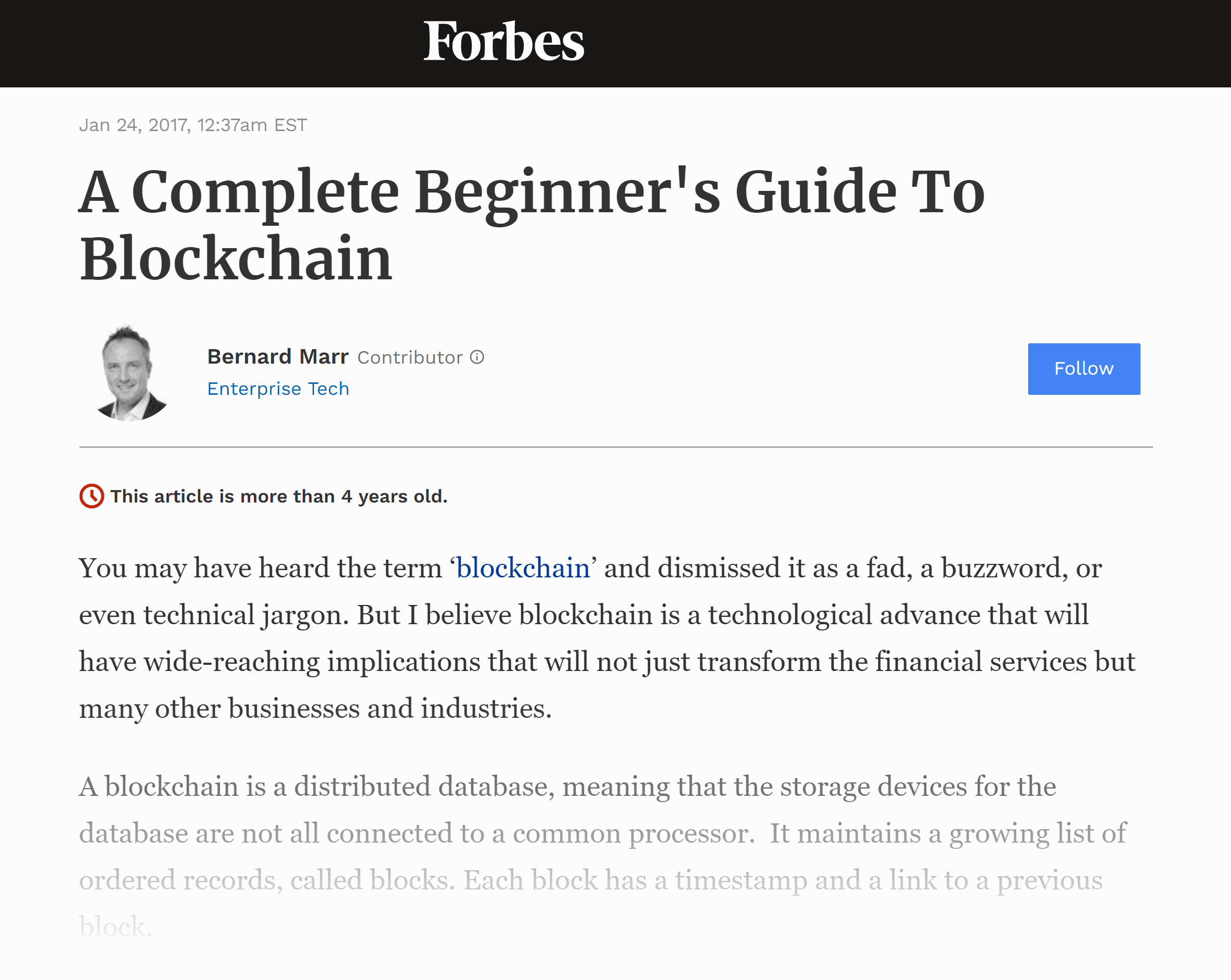
We also discovered that content containing “data”, “reports”, “study”, “science”, “facts” and “research” in their titles had relatively high evergreen scores.
This shows that users are hungry for data-driven information.
Here’s an example from the articles that we analyzed:
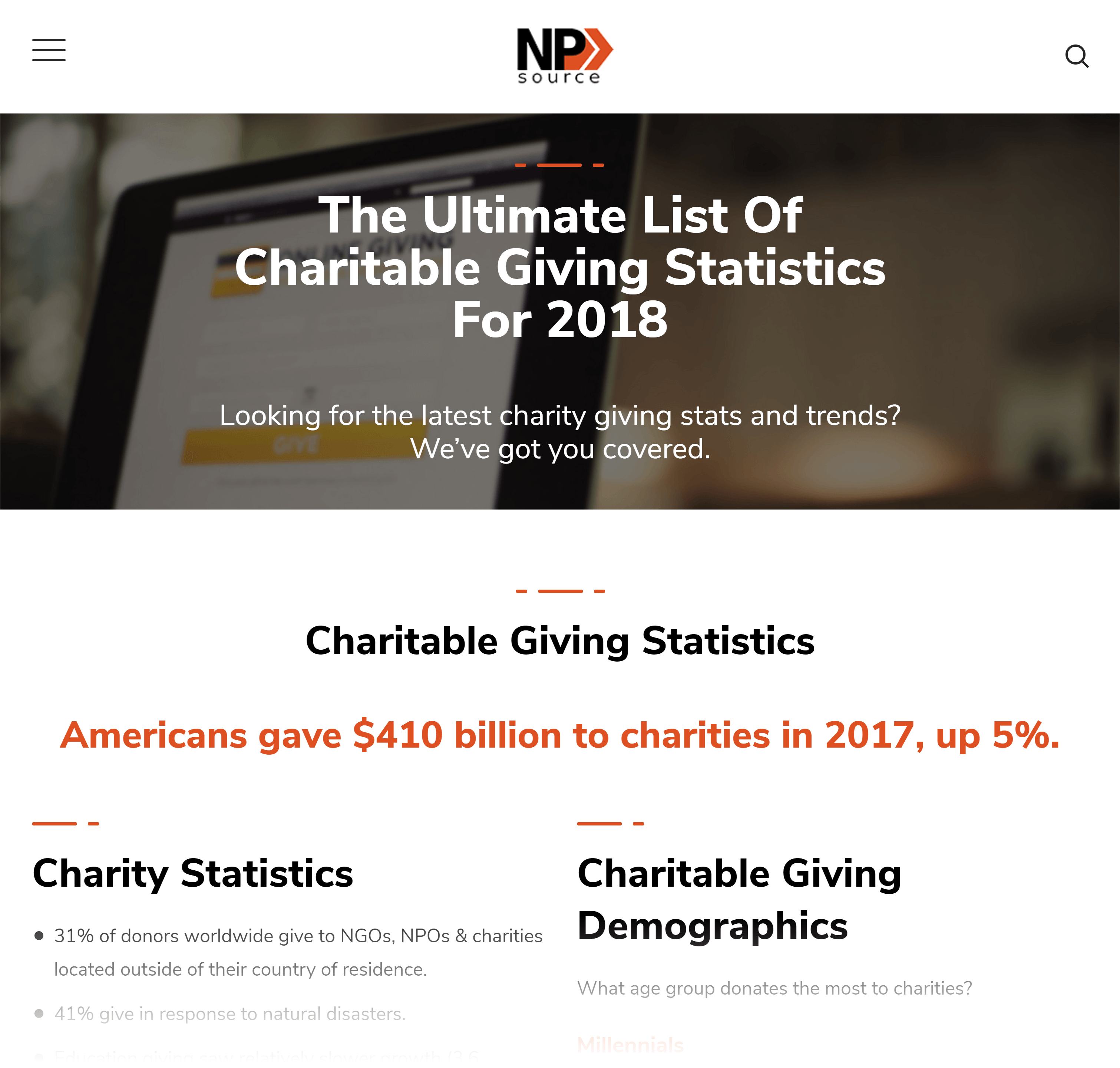
(Note how this piece is from 2018. Yet it continues to generate backlinks.)
Finally, content about “the future” and “trends” get shares over time. Which makes sense: people are always on the lookout for what’s coming next. And as long as these trend-related posts have a long outlook, they can remain evergreen over a fairly long period of time.
Here’s an example of an evergreen post focused on trends:
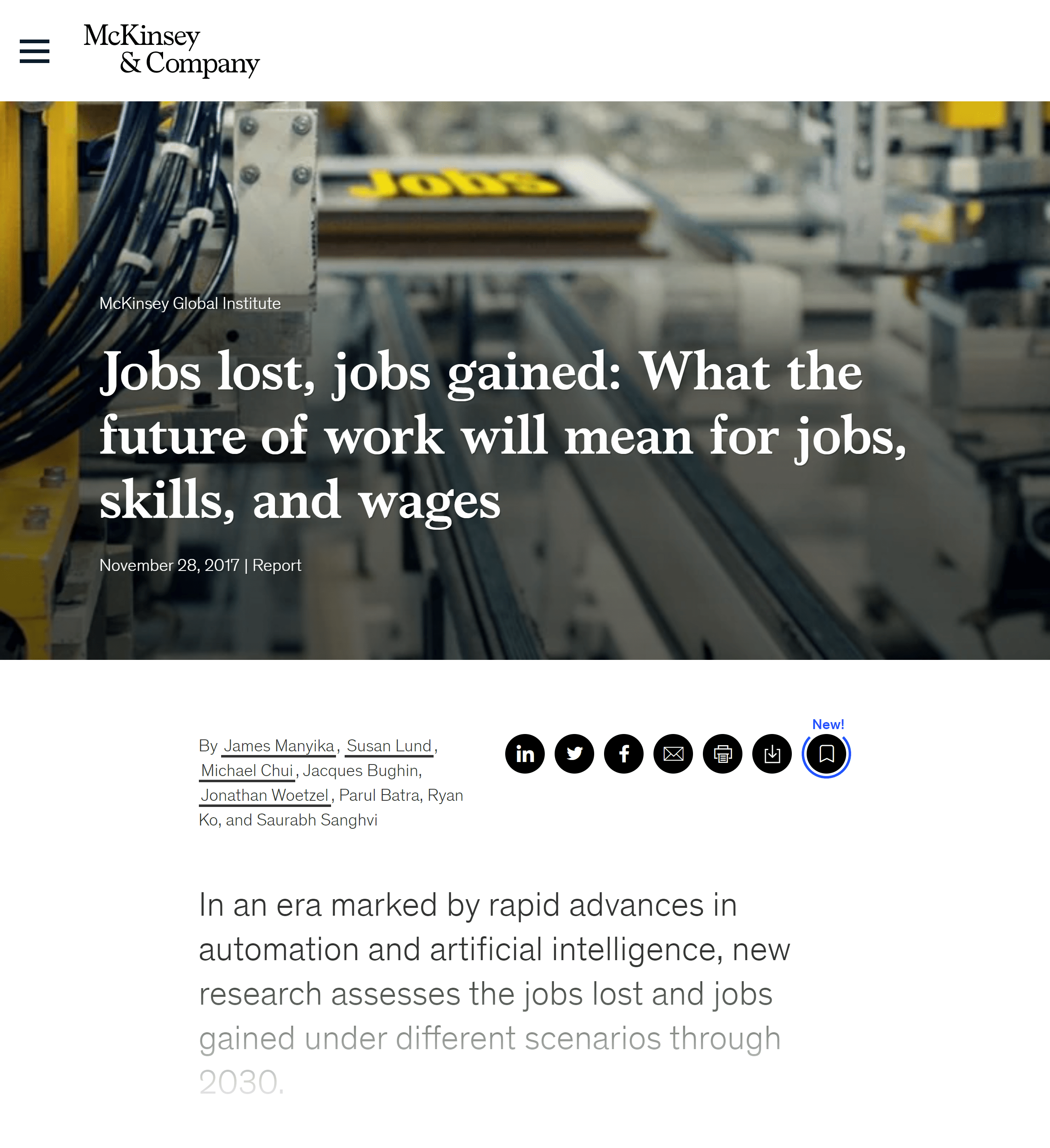
Key Takeaway: Readers are hungry for content that curates the best, collects information in a single place and includes plenty of data.
Social Media Examiner, HBR and Mindful Regularly Publish Evergreen Content
At this point we had analyzed a number of factors that correlate with evergreen content. And we wanted to see which publishers did the best job at actually creating it.
Specifically, we analyzed all domains in the BuzzSumo database that have published at least 10,000 articles.
Here’s what we found:
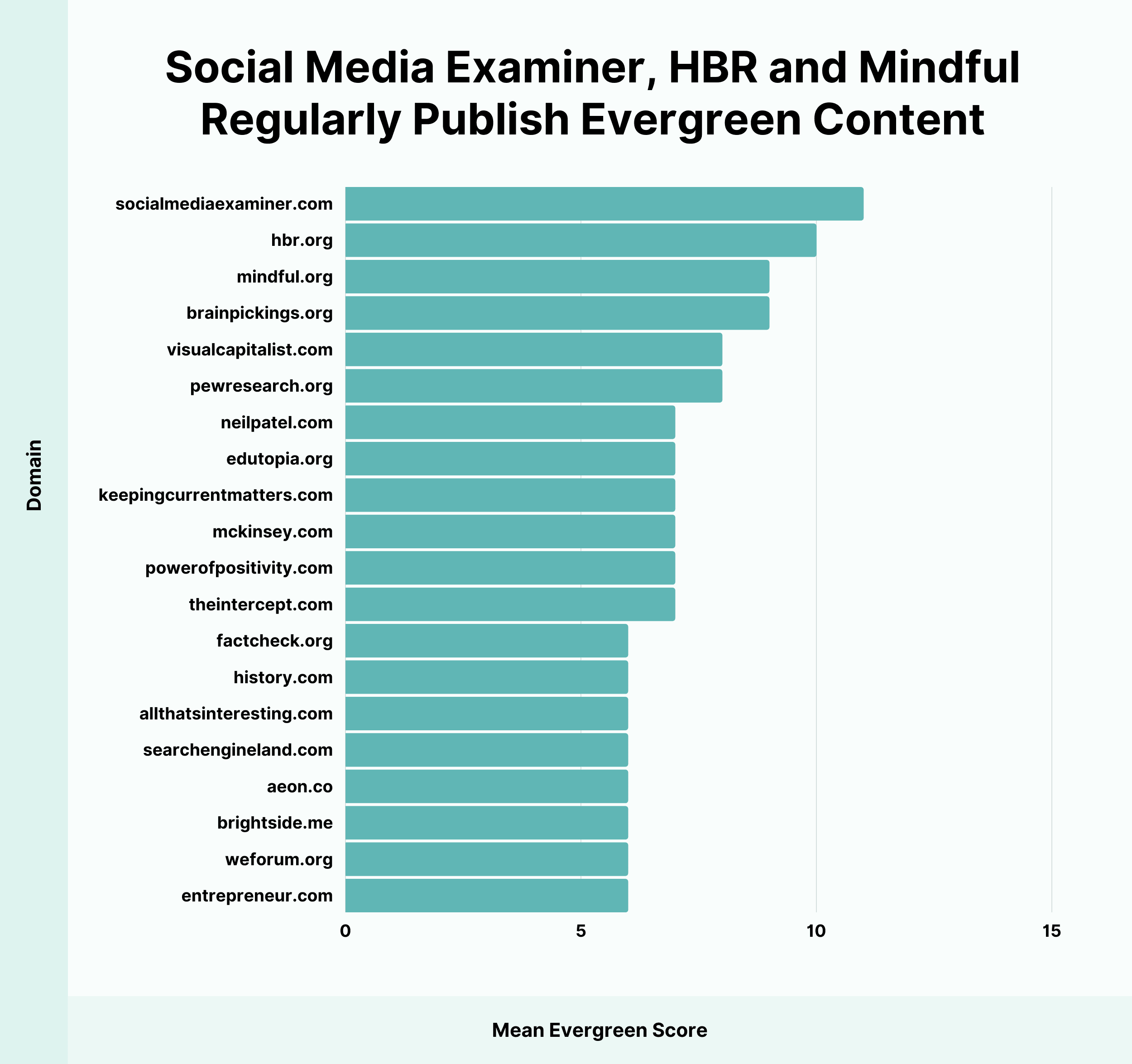
Among the domains we looked at, Social Media Examiner, HBR, Mindful, Brain Pickings and Visual Capitalist publish evergreen content at world-class levels.
Although the types of content and topics that each of these sites cover differ, there are some commonalities that tie their content together.
First, these publishers lean heavily on content formats that we already discovered correlate strongly with evergreen content.
Social Media Examiner essentially only publishes content in these two formats.
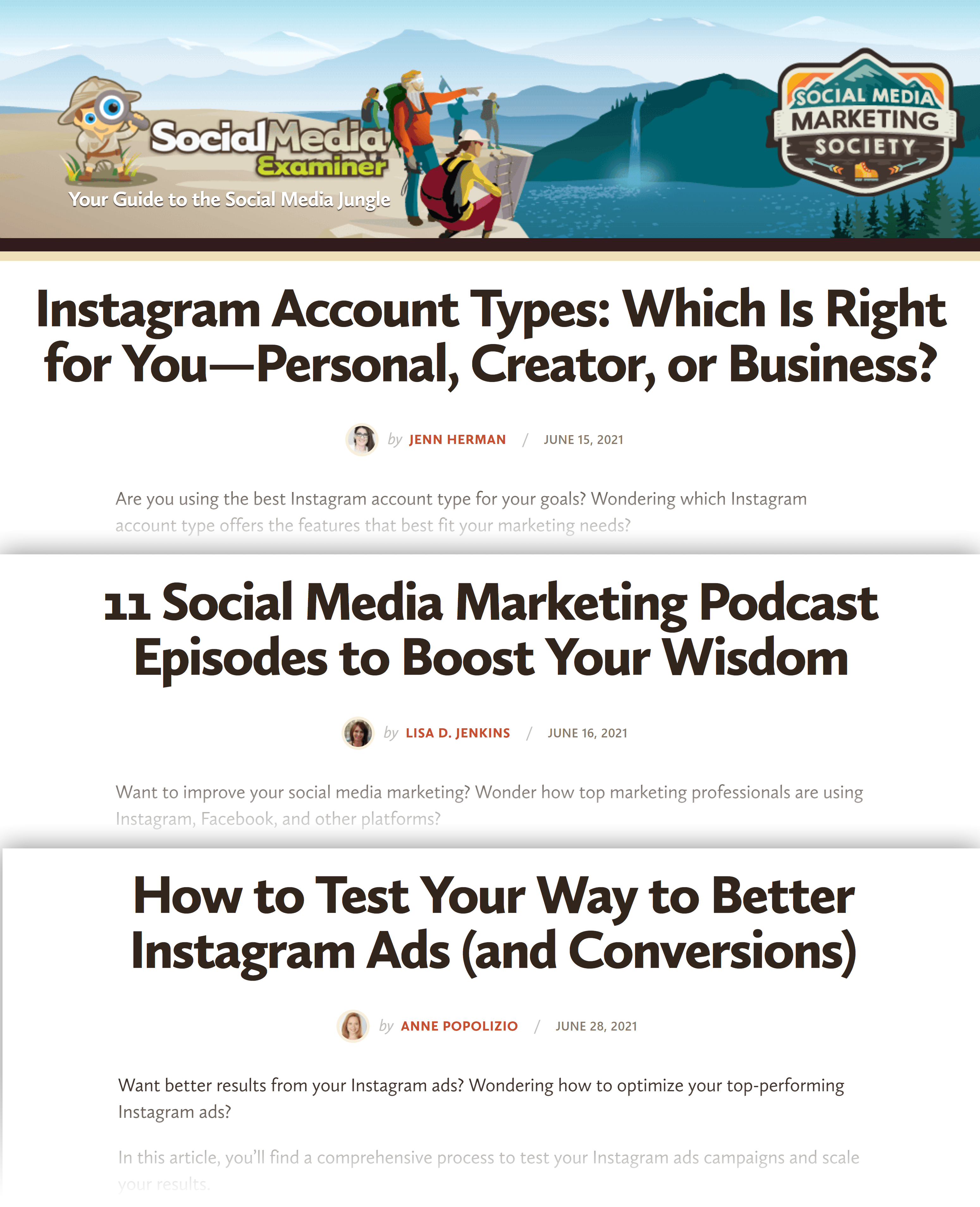
While HBR leans heavily on how-to content.
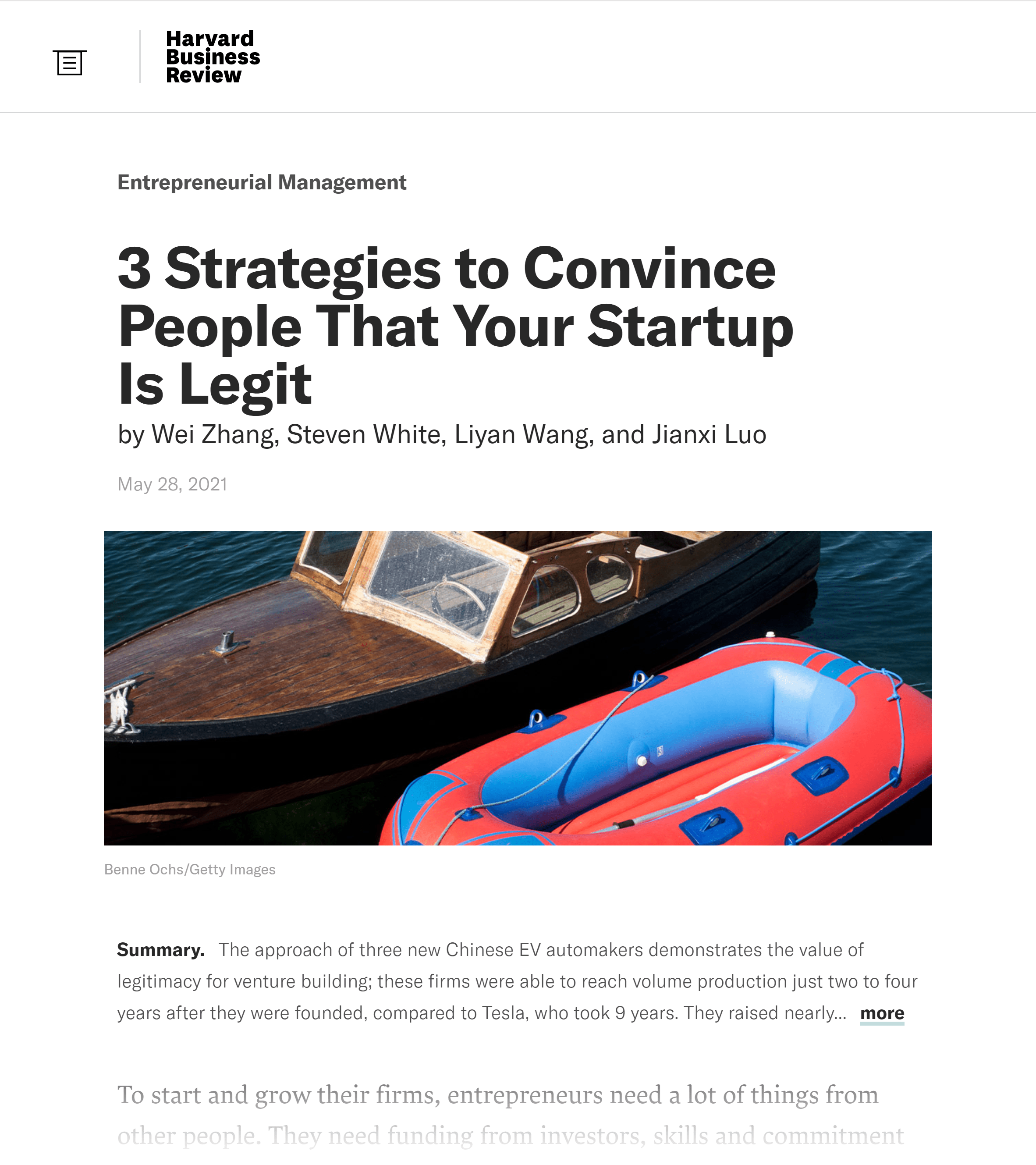
And Mindful tends to write lots of “what” and “why” posts — two formats that significantly correlate with Evergreen scores.
Second, the content itself is outlined from scratch to stand the test of time:
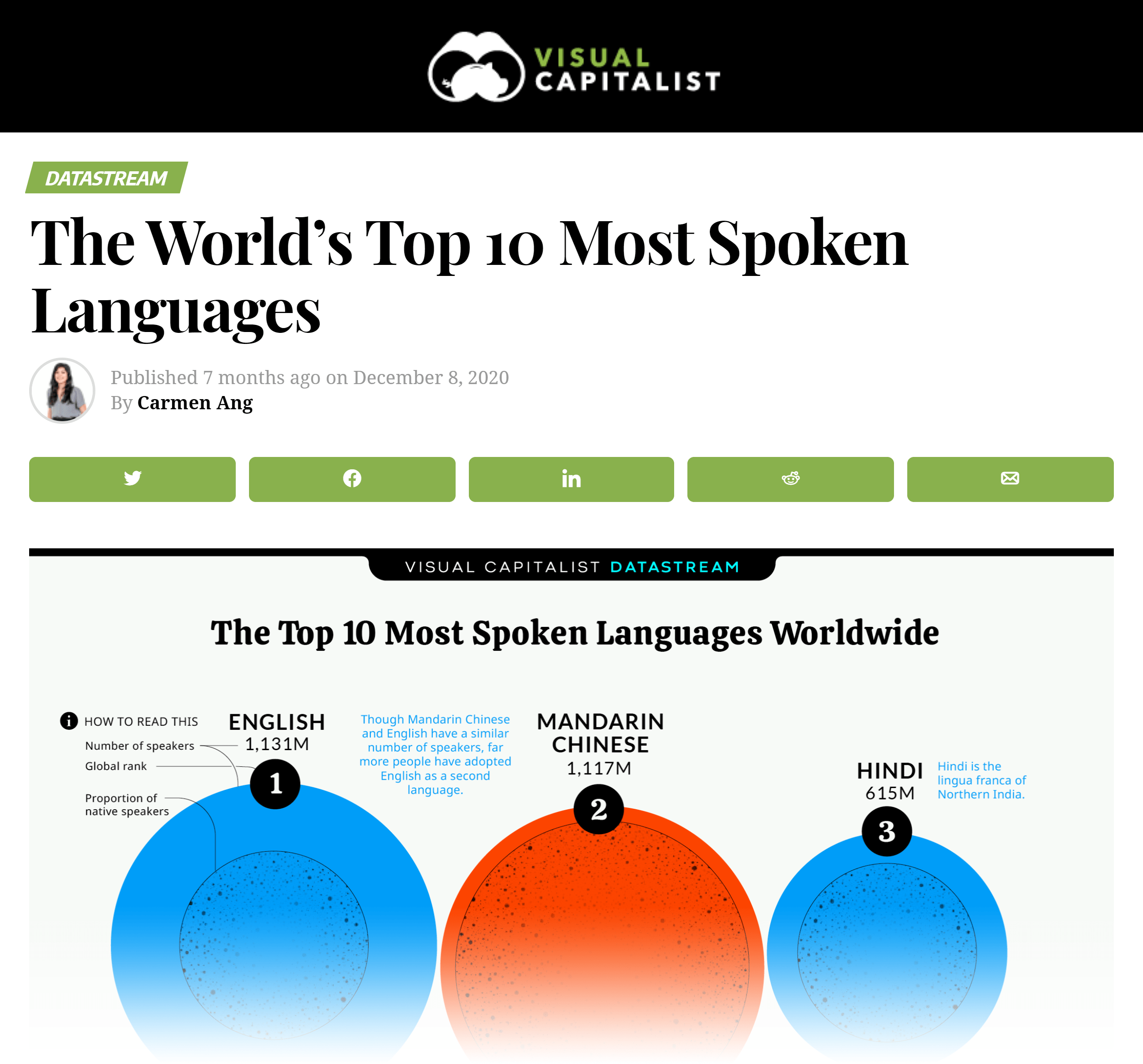
And for content that can’t be truly evergreen (like the content Social Media Examiner publishes), it’s designed from scratch to be content that can be regularly updated.
For example, this post from Social Media Examiner is likely to go out of date as LinkedIn’s UI changes.
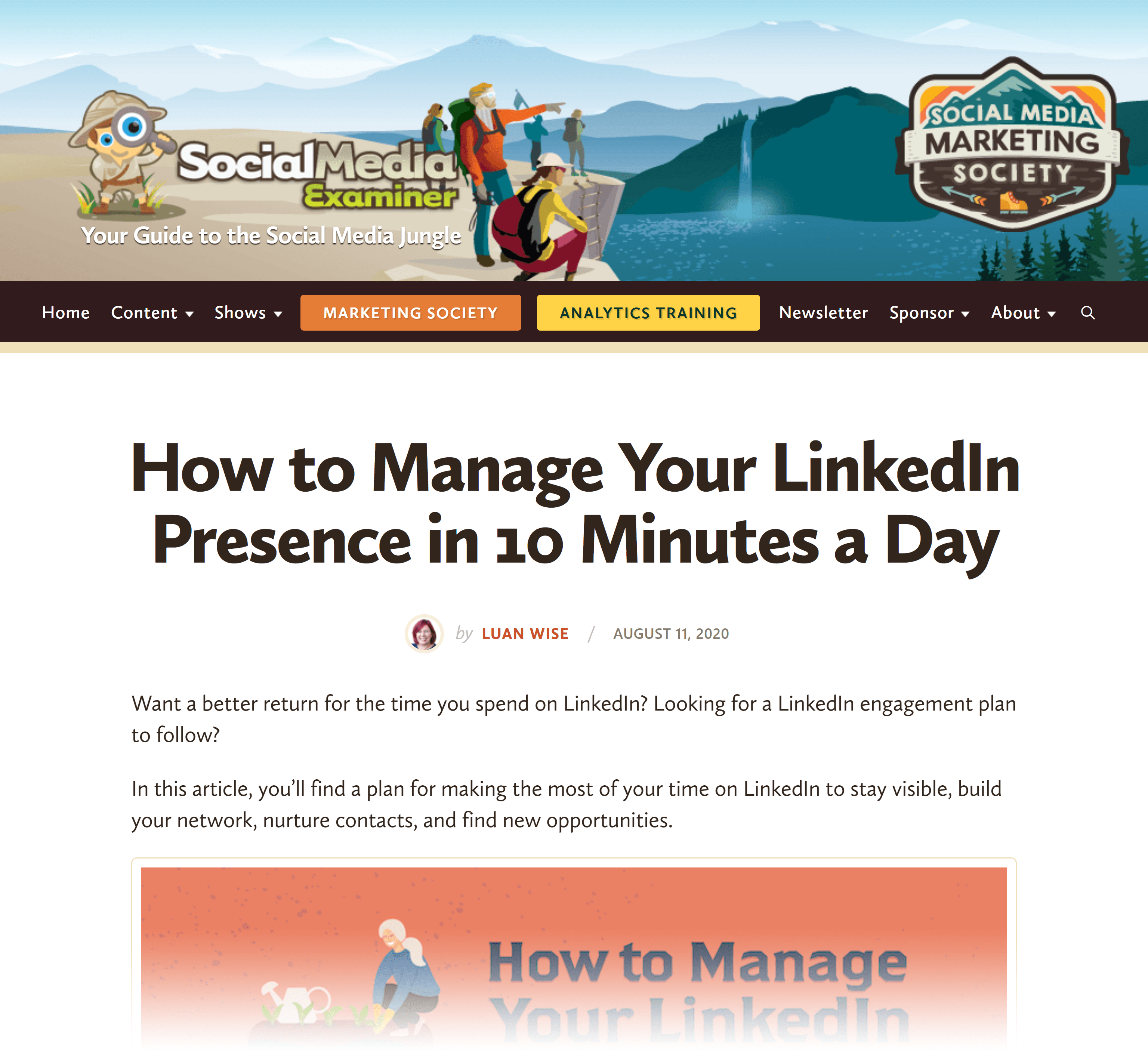
But the core content and strategies aren’t going to stop working any time soon. This means the post will just need a quick touch-up (and some new screenshots) sometime over the next 12-18 months.
Key Takeaway: Publishers that put out the highest amount of evergreen content tend to focus on effective content formats, evergreen content types, and topics that people are likely to be interested in years down the road.
Content About Technology, Marketing and Health Has the Highest Overall Evergreen Scores
When it comes to different verticals, which tend to publish evergreen content most often?
To answer this question we analyzed 12 verticals. And sorted them by their average evergreen scores.
Here are the results of that analysis:
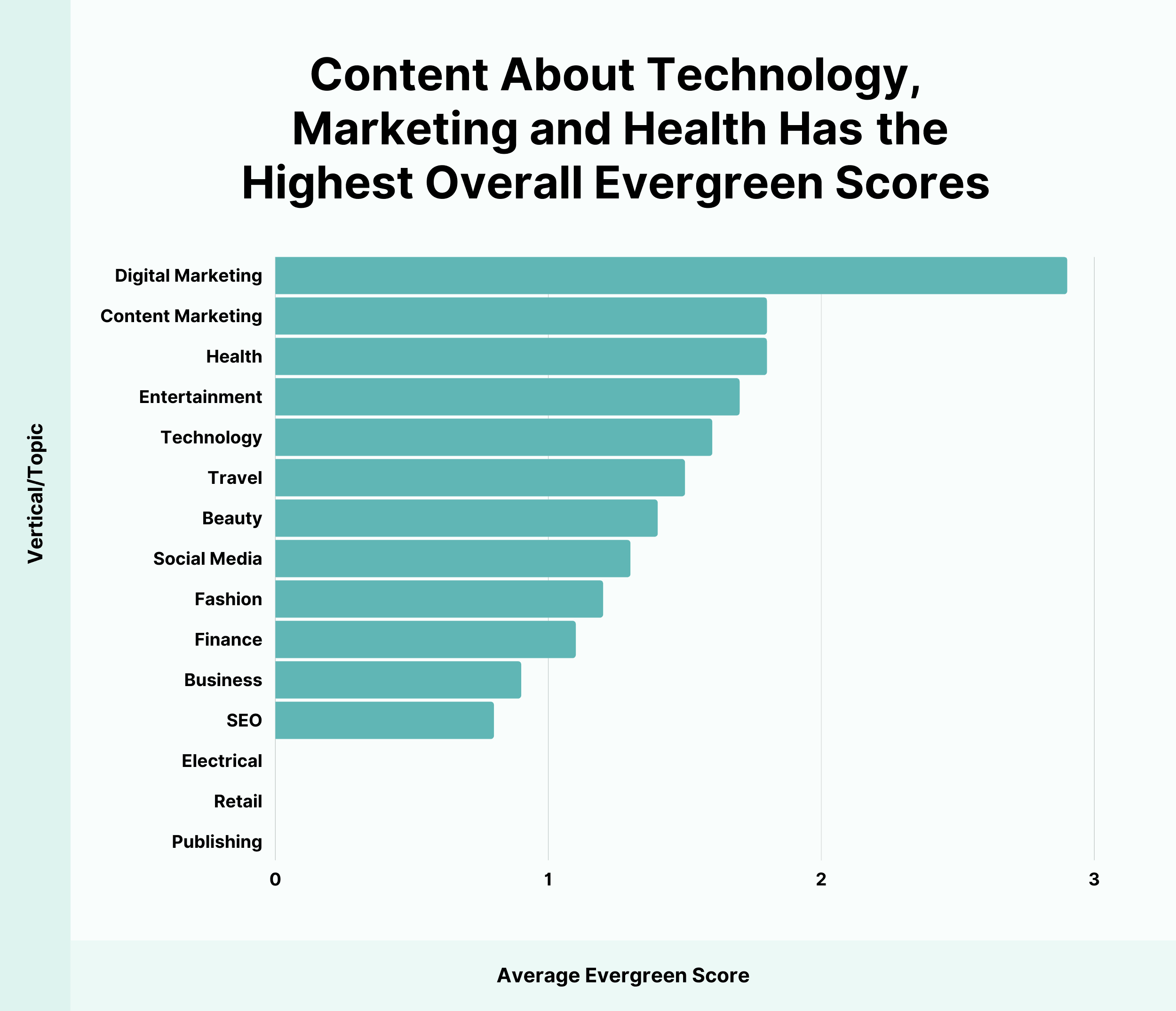
Overall, content about digital marketing, content marketing, health and entertainment tend to be highly evergreen.
For example, here’s a blog post about marketing with a very high Evergreen score:
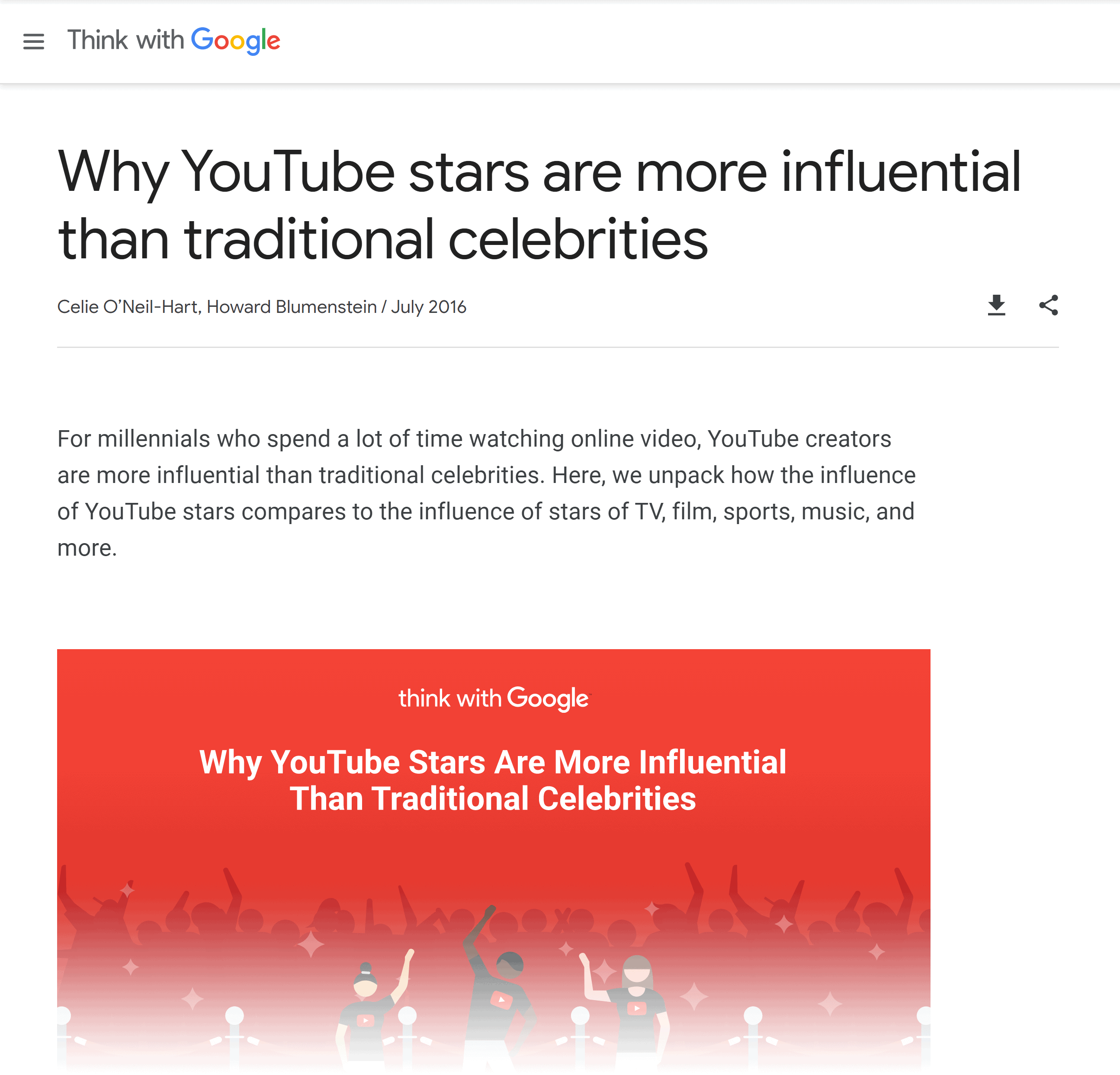
On the other hand, content related to business, finance and fashion is less likely to have high evergreen scores.
To anyone in the content world, these findings may not come as a surprise. As we touched on when we talked about Social Media Examiner, a fair amount of marketing-related content is evergreen (or can be made evergreen with a few tweaks).
It’s the same story with health-related content. Like marketing content, articles about health need updating over time. But the guidelines and advice are fairly durable as time goes on.
Here’s an example of a piece of evergreen content in the health space:
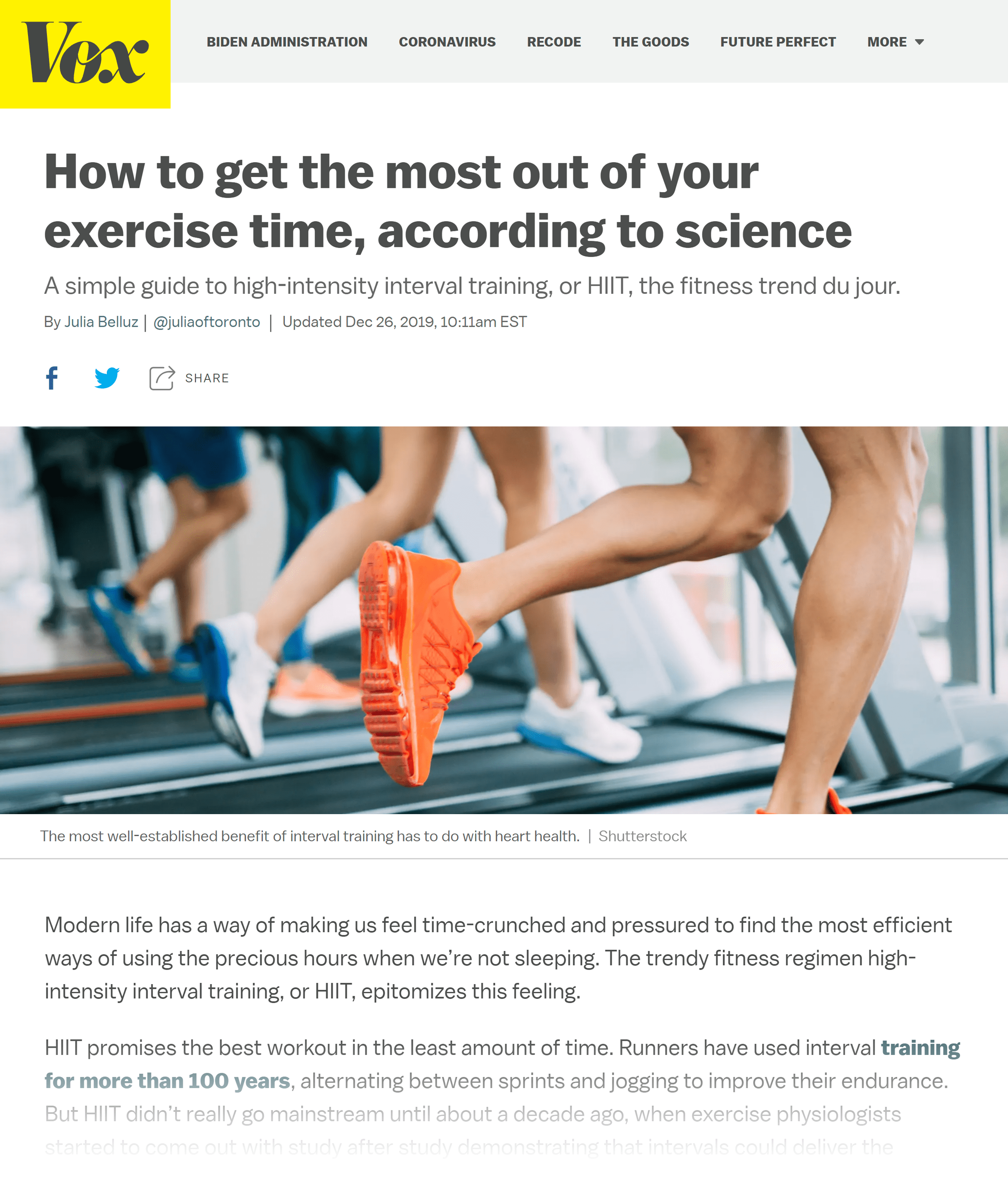
On the other hand, content about finance and fashion tends to be more focused on events or fads happening during the current day or week.
Key Takeaway: Verticals publishing the highest rate of evergreen content include marketing, technology, health and entertainment.
Conclusion
That wraps up our analysis. I hope you found the data interesting and useful.
And I’d like to again thank Henley Wing and Louise Linehan from BuzzSumo for making this study possible.
With that, it’s time to hear what you have to say.
Were any of these findings surprising? Or maybe you have a question.
Either way, let me know your thoughts in the comments section below.
